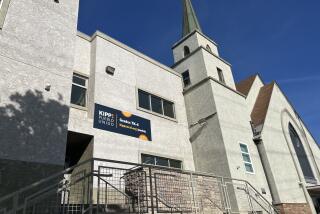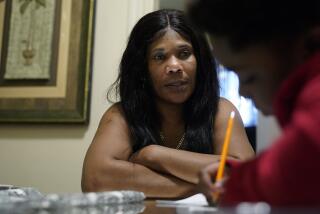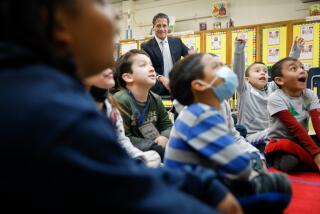With the coronavirus keeping campuses closed, parents report academic, financial struggles and stress

Parents fear that their children are losing vital learning opportunities with school campuses closed due to the coronavirus, and these academic struggles appear linked to economic hardship and possibly race, according to local and national surveys released Monday.
In Los Angeles, fewer than half of families in a recent poll of public school students said distance learning has been successful — and more than half also report one or more family members losing jobs, the district reported.
A separate national study, funded by the Bill and Melinda Gates Foundation, found that 15% of K-12 parents don’t think their children will be prepared for school next year. This research also documented what many educators consider to be obvious: that children in low-income families have more limited access to computers for schoolwork, a greater problem than ever with campuses closed and most learning moving to online formats.
L.A. Unified and most other school systems in California have tried to even things out by distributing computers since campuses closed in mid-March. And some districts, including L.A. Unified, also have provided broadband internet access. But even in L.A., families reported problems with technology well into May.
“The survey results don’t surprise me,” said UCLA education professor Pedro Noguera. “Many of the concerns raised by parents were present before the pandemic. Now they have been exacerbated. As the national survey shows, these issues aren’t limited to L.A.”
More children are likely to experience toxic stress during the pandemic, which could lead to devastating effects in the future.
Sandra Nunez has boys in third and fourth grade at Will Rogers Elementary in Lynwood Unified, a school system of 14,000 students south of downtown. A teacher’s assistant who is in college to become a teacher, Nunez lost her job at a Catholic school when the campus closed. She is trying to balance childcare, guiding her children’s studies and keeping up with her own.
“It’s been a little tough,” she said from her car as she was waiting in the campus parking lot for a loaner computer that might ease the technology logjam at home.
In Downey, a city in Southeast L.A. County, theater teacher Kyle Deichman said that some of his students said they haven’t made it to online class sessions because they took jobs to help support their families.
About half to two-thirds of students have been turning in assignments, “down from about 85%,” said Deichman, who teaches at Warren High School.
L.A. schools Supt. Austin Beutner called attention to poverty in his weekly update, which is broadcast on Mondays. Before the pandemic, he said, 70% of district families reported a household income of less than $50,000 and 35% less than $25,000. Since then, 57% of families reported at least one household member who has lost work due to the COVID-19 pandemic.
“Let that sink in,” Beutner said. “Most families were struggling to get by before this crisis and for more than half of them, their situation has gotten worse.”
Some 77% said they are making use of free meals being distributed by the nation’s second-largest school system.
Beutner also wanted to emphasize positives in the survey: More than 90% said they have been able to use technology to communicate effectively with teachers; nearly 90% said they have received instructional materials for reading and math. And nearly 75% rated their school’s efforts as good or excellent.
But that doesn’t mean that distance learning is working — or, at least, that it is working as well as classroom instruction would be. How and when to reopen schools remains a topic of debate and uncertainty.
Of concern was that 26% said they lacked enough computers at home and nearly half said they lacked high-speed internet. This finding is seemingly at odds with separate statements from L.A. Unified indicating that virtually all students are “connected” via computer and internet. However, the survey was conducted from April 19 through May 6, during a period when it is likely additional families received technology help.
Adequate connectivity has been a problem across the state.
Schools in rural parts of the state are struggling not only to teach but to reach students. Many lack internet access and rely on schools for food.
“We need to think not just about access, but meaningful access,” said John Rogers, director of UCLA’s Institute for Democracy, Education, and Access. “One example: Access to a laptop or tablet (or phone) does not mean that a student has sole access. Anecdotally, we hear about kids in lower-income families sharing devices in ways that limit their ability to participate meaningfully in the lessons. In addition, even when students have a device, they may not have a quiet place to use it.”
In the L.A. survey, among the issues that strong majorities said were “very concerning” were: “ensuring your child is on track to graduate from high school” (60%) and “ensuring your child does not fall behind academically” (78%).
Eighty percent of families said their children’s stress levels were higher than normal and about 60% of parents said their own stress level was higher.
Citing such problems, Beutner renewed his call to make spending on schools a top budget priority. Although Gov. Gavin Newsom provided some protection to schools, his proposed education budget still includes cuts of 10% or more.
The Gates research underscores economic disparities, finding that black and Latino families reported greater fear of losing jobs than white families. And the pandemic also was having a greater effect on future education plans within these minority families. According to the survey, all high school graduates had become less likely to attend a four-year college, but the trend was more pronounced for black and Latino students.
The wide-ranging Gates research is led by the Civis Analytics, with particular focus on Washington, Florida, Texas and New York; about 2,000 K-12 parents were among the 8,000 responses gathered May 8 through 10 via online web panels and weighted to reflect the adult U.S. population.
The L.A. Unified survey was made available to all Local District East families via text and email in English and Spanish from April 19 through May 6. Of 85,000 eligible families in that part of the school system, about 7,300 — or 9% — submitted valid partial or complete surveys. Total K-12 enrollment is about 450,000.
More to Read
Sign up for Essential California
The most important California stories and recommendations in your inbox every morning.
You may occasionally receive promotional content from the Los Angeles Times.












